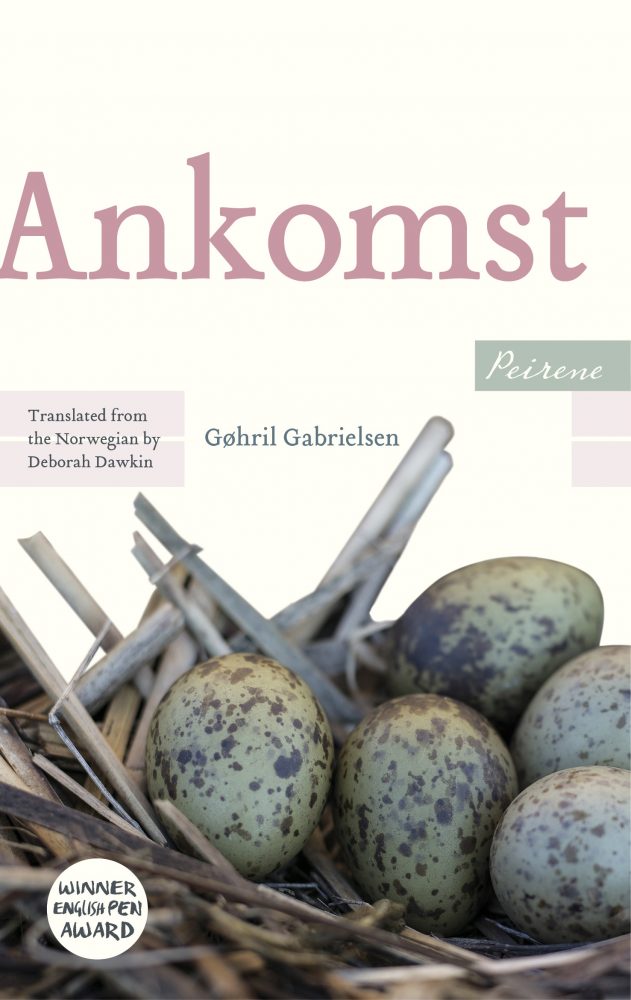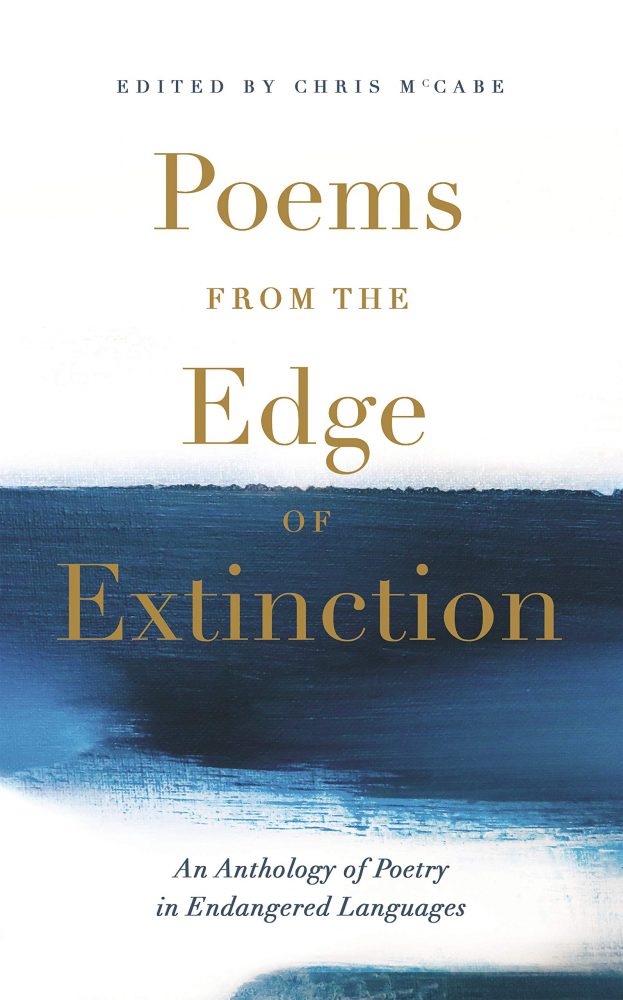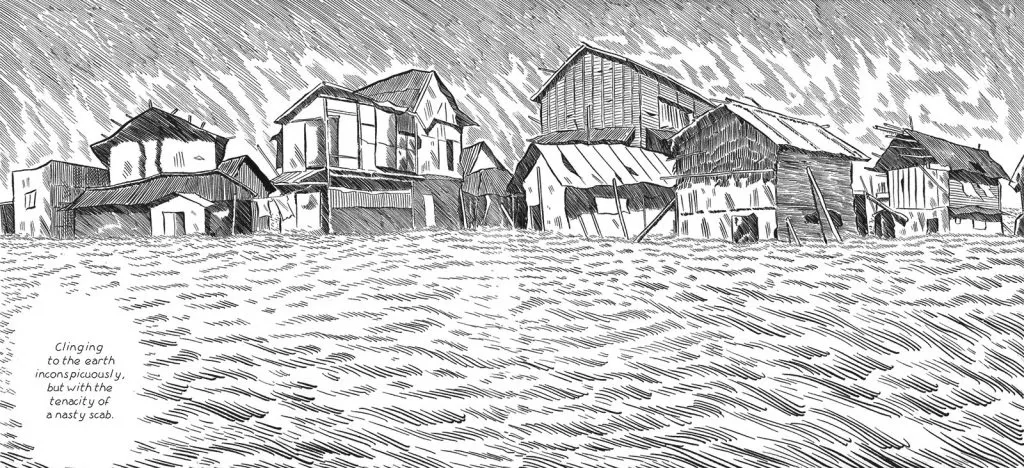Translated from the Norwegian by Deborah Dawkin
Picture yourself in a cabin, alone at the edge of the world, with Norwegian fjords on one side and endless snowy wastes on the other; only the seabirds and thoughts of the family you abandoned for company. Or did you abandon them?
Well, you have a lot of time to mull that over. Didn’t you come here in the context of work? You’re getting your PhD in environmental science, after all. This isn’t about your divorce or your daughter. This is the story of Ankomst, a Norwegian word which roughly translates to ‘arrival’.
In Ankomst, Gohril Gabrielsen invites us into the intimate world – half isolated cabin, half broken headspace – of a nameless narrator: a 36-year-old scientist who has left her husband for another man and, in the midst of this turbulent time in her life, has taken herself far away to a remote northern region of Norway to work.
But when work is all quiet observation in a silent place, thoughts become obsessions and worries become anxieties and fears turn to paranoia.
Read More: Essential Norwegian Novels

We spend the entire 180 pages of Ankomst in the mind of a woman whose name we don’t know, understanding almost from the beginning that we are dealing with an unreliable narrator. She’s a scientist, so we know she is clever. She’s headstrong, makes tough decisions, lives for herself but cares for her child, is ambitious and willful. But is she all right?
There is a kind of cyclical rhythm to the events of Ankomst. In a book just 180 pages long, we have fifty chapters, and each chapter is anywhere between one and five pages long. These short chapters are like bursts of information, narrated in the first person as a kind of pseudo-diary.
Sometimes there are dates, like a journal, but not always. This inconsistency gently reinforces the inconsistencies of our narrator’s thoughts. When her mind is clear, we get entire chapters of dry, dull scientific information; all numbers and data and uninteresting observations.
These moments encourage us to trust her, but they quickly give way to imagined scenarios as she invents in her mind the story of a family who once lived in her cabin a century and a half ago.
She gives them dialogue and draws out specific events in her mind as though they were a novel she’s writing. These fantasies come and go sporadically, but the majority of her consideration is given to Jo, the man she left her husband for. Jo is supposed to be joining her in the cabin, but he keeps delaying for the sake of his daughter.
This key detail about Jo is the fulcrum on which everything else tips and spins in our narrator’s mind. If he is so dedicated to his child, why isn’t she? How could she abandon her child with S, a man she insists is abusive and dangerous?
And from the way Jo speaks on their scheduled Skype calls, was he even worth leaving S for? These nuggets of doubt balloon into intimidating, antagonistic thoughts which our protagonist has all the time in the world to argue with.
Read More: Review of Sea of Ink by Richard Weihe
Ankomst is a character drama with only a single character. Memories are shown not as flashbacks but as imagined approximations of memories. We only have her word that these people even exist, let alone that their actions and personalities are as she says. And if she is in the habit of imagining the story of the family who once lived in her cabin, what else is she imagining?
The success of this book hinges entirely on Gabrielsen’s ability to carve an interesting protagonist out of a nameless, faceless woman. To chain the reader to the inner walls of her brain and have what we see be not only compelling but frightening, confusing, and exciting.
Gabrielsen mixes her thoughts and actions in a cycle that creates a predictable rhythm — one which we are always waiting for her to shatter: observations of wild birds, sublime descriptions of her surroundings, an invented story of a long-dead family, memories of S, thoughts of Jo, concerns that give way to paranoia, rinse and repeat.
The plotting is a masterful play at embedding the reader in this cycle, like a rollercoaster we can never get off, and which only gets faster as the room grows darker. Aside from our protagonist and her personal character drama, it’s the sharp pacing of this novel, at odds with the sparse and empty beauty of her surroundings, that makes this such an intense read.
Chapter after tiny chapter, each one a mystery box. All the while, we are frequently reminded of the serene, peaceful setting of the novel: a wood cabin in the January wilderness. Cold and dark but peaceful, safe, and beautiful. All of this is at odds with the world inside her head, and that simple dichotomy of place and mind is an endless war that makes for intense, exciting, and somehow beautiful reading.
All of this is supported by some truly gorgeous language in translation from Deborah Dawkin. While I may not speak Norwegian, and so can’t compare, that’s never the point of literary translation.
The point is to take something that’s beautiful in one language and make it beautiful in another. Dawkin manages this perfectly, using semi-gothic sublime descriptions of the world our protagonist has trapped herself in, while also inviting us to become morbidly obsessed with the world inside our protagonist’s head.
Conclusion
It is remarkable what can be created with a minimal set of tools: a dark, quiet place; a single character; a handful of memories; and plenty of time. With nothing but these ingredients, Gohril Gabrielsen weaves a complex tale soaked in paranoia and rich in fantasy and imagination.
This is a study in isolation, freedom, and loneliness. This is the story of an ordinary person who does not know us and yet does not trust us. Nor does she let us trust her. Ankomst is a story of steadily climbing dread which takes place solely in the mind of a woman alone with her thoughts. It’s intense, beautiful, and harrowing. A book to make you fear your own mind.



